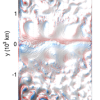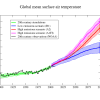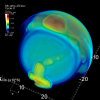News Archive
Jeff Broughton Brings 30 Years of HPC Experience to NERSC as New Head of Systems Department
Jeffrey M. Broughton, who has 30 years of HPC and management experience, has accepted the position of Systems Department Head at the Department of Energy's (DOE) National Energy Research Scientific Computing Center (NERSC). Broughton, who most recently served as senior director of engineering at QLogic Corp., joins NERSC on Monday, August 3. Read More »
NERSC's Franklin Supercomputer Upgraded to Double Its Scientific Capability
The Department of Energy's (DOE) National Energy Research Scientific Computing (NERSC) Center has officially accepted a series of upgrades to its Cray XT4 supercomputer, providing the facility's 3,000 users with twice as many processor cores and an expanded file system for scientific research. NERSC's Cray supercomputer is named Franklin in honor of Benjamin Franklin, the United States' pioneering scientist. Read More »
Protein structures revealed at record pace
BERKELEY, CA — Scientists at the U.S. Department of Energy’s (DOE) Lawrence Berkeley National Laboratory have developed a fast and efficient way to determine the structure of proteins, shortening a process that often takes years into a matter of days. Read More »
Cecilia Aragon Honored with the Presidential Early Career Award
BERKELEY, CA – Cecilia Aragon, staff scientist in the Lawrence Berkeley National Laboratory's (Berkeley Lab) Computational Research Division (CRD) was honored with the Presidential Early Career Award for Scientists and Engineers (PECASE), the U.S. government's most prestigious award for early-career scientists. Award winners were announced in a White House press release on Thursday, July 9, 2009. Read More »
Lavanya Ramakrishnan Is Named 2009 Alvarez Fellow
Lavanya Ramakrishnan joins CRD's Advanced Computing for Science department as a Luis W. Alvarez Fellow. She will spend the next few years exploring different techniques and tools for managing science workloads that rely on high performance and distributed systems such as grid and cloud systems. Read More »
Green HPC Podcast Episode 1: Sifting Through The Hype
In the inaugural episode of the Green HPC podcast series we will examine the issues that datacenter managers and system designers are facing with high performance computing systems of all sizes today. Even if you aren’t “green at heart,” there are very practical and compelling reasons why a growing awareness of energy use in your datacenter — how much, where it goes, and what it costs you — is critical to your success. Read More »
Berkeley Lab Scientists Contribute to Major New Report Describing Climate Change Impacts on the U.S.
Berkeley, CA—Two researchers at the U.S. Department of Energy’s Lawrence Berkeley National Laboratory (Berkeley Lab), Evan Mills and Michael Wehner, contributed to the analysis of the effects of climate change on all regions of the United States, described in a major report released today by the multi-agency U.S. Global Change Research Program. Read More »
NERSC Helps Discover Cosmic Transients
An innovative new sky survey, called the Palomar Transient Factory (PTF), will utilize the unique tools and services offered by the Department of Energy's (DOE) National Energy Research Scientific Computing Center (NERSC) at the Lawrence Berkeley National Lab (Berkeley Lab) to expose relatively rare and fleeting cosmic events, like supernovae and gamma ray bursts. Read More »
ESnet Rolls Out IPv6 Network Management System
Although it has been a network protocol standard for more than 10 years, IPv6 (Internet Protocol version 6) has only been minimally implemented by the networking community. But that could change now that the U.S. Department of Energy’s Energy Sciences Network (ESnet) has deployed a production IPv6 management system across its entire network. Read More »
VISUALIZING THE FUTURE OF SCIENTIFIC DISCOVERY
As computational scientists are confronted with increasingly massive datasets from supercomputing simulations and experiments, one of the biggest challenges is having the right tools to gain scientific insight from the data. Read More »







 Instagram
Instagram YouTube
YouTube




